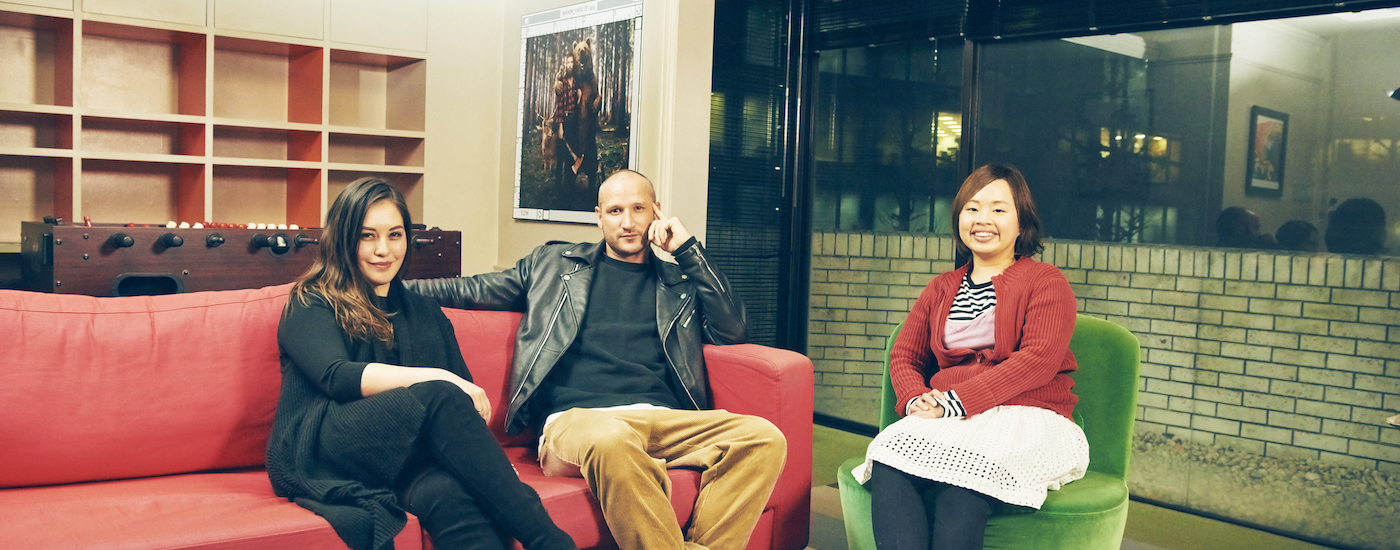When you walk down the street, it is a common sight in 2018 Tokyo to see people other than Japanese living there. In the present where foreigners coming to Japan for ‘2020 Tokyo’ continue to grow, what kind of image does the current Tokyo scene look like to the eyes of the men and women who are not just visiting, but are working, playing, and living here? We asked three creators Ms. Marika Rinehart, Mr. Chace Fedor and Ms. Deborah Ng (pictured from left to right) at creative companies based in Tokyo that play on a global stage, UltraSuperNew, monopo, and Toboggan, what they are feeling now about the Japanese people they saw and Japan's creativity.
ーーFirst, tell us about where you’re from, the circumstances for visiting Japan, and your current job.
Deborah (Toboggan Inc.) :I am from Singapore, and work as a production assistant at a film production company in Tokyo. I graduated in theatre studies at a Singapore university, but my first job was in the medical field which was completely irrelevant to my major. I have however, always had a strong passion for making up stories since I was a child, and I write fiction in my free time. I was then transferred by that company to Japan to work, but because that feeling of wanting to create stories persisted, I took film directing classes and screenplay courses at night while working in the day, before finally changing jobs. Since I speak English and Chinese, I felt that a production company that did overseas projects would be an ideal place for me to put my linguistic capabilities to good use and I found Toboggan among those few companies in Japan who do so.
Marika (UltraSuperNew) :I was born in California, moved to New York City for college at age 18 and lived there for seven years, then came to Tokyo in 2016. I went to Parsons The New School for Design in New York, and worked as a celebrity stylist’s assistant for several months after graduation. After then working at an advertising agency for several more months, I worked as an in-house graphic designer for three years. All this time, I had wondered what it would be like to work in Tokyo (my mother is Japanese) and also wanted to go back to the agency side, so I researched agencies in Tokyo and found UltraSuperNew. The agency was involved with many different types of clients, and worked on projects that were unique to Japan. I decided to apply for a position and, after several interviews over Skype, I was able to earn a position on the social media team. As a content editor, my main responsibilities include content strategy, planning, and production.
Chace (monopo) :I am from Vancouver, Canada. I came to Tokyo my first time in middle school on an exchange program, travelled here in my 20’s and on a working holiday. I’ve been attracted to Tokyo for most of my life. So you could say that living in Japan has been a mission of mine. When I was a freelance copywriter while studying Japanese, I met monopo founder and CEO, Sasaki, while broadening my connections in the creative industry. One night while discussing Tokyo’s ‘branding’ as a city — we agreed that the emphasis placed on worn-out cliches like Harajuku Girls, Johnny’s, sushi etc. were out of touch and tone deaf. We agreed on how Tokyo’s depth and layers were not being communicated authentically, so we came up with the idea for a project called ‘powerdby.tokyo.’ On which I now work as creative director, executive producer, and business development.
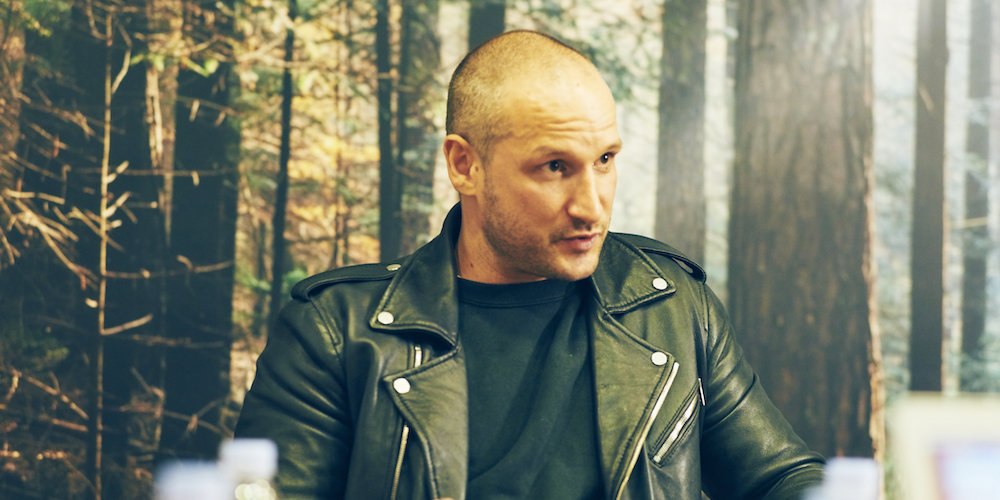
ーーAre there things that you feel are different about your home country and Japan?
Deborah (Toboggan inc.):Japan is very conscientious! Singapore is rather laid back. When I work with a Japanese crew, I feel that production time takes significantly longer because they are very particular on details and do everything very slowly and carefully. I think it is fine if it takes time, but there are also times when I think they take too much time. I feel that to the Japanese, the word ‘compromise’ is still a rather foreign concept. This can be good because it means that they are strict about their quality. For example, the famous sushi shop ‘Sukiyabashi Jiro’—which could definitely make more money if they expanded to a chain now since it has been made into a movie, and visited by former president Obama—has the stance of our shop is ‘here only’. Moreover, even though they have been criticised for their strict mealtime of only 20 minutes, they insist on their method because they believe that it is the ‘best way of experiencing sushi’
Chace (monopo):Japanese have a particular brand of integrity they apply to their work. They are saying ‘I am doing this for myself rather than for someone else.’ Even if no one is aware of your process and doesn’t know if you cut corners or not, is it not important to know before you go to sleep at night that you know you did it the right way? And that integrity is conveyed to clients and the customer experience as a whole. Japanese are more sensitive to that kind of sincerity than other countries’ people. I think it is easy for them to notice if someone is more considerate or conversely cutting corners, or if cheap materials are used in the product.
Marika (UltraSuperNew):I’ve learned that we need to be careful when portraying Japanese traditions and culture because of their heavy influence on society in general. For example, when creating seasonal content for a brand’s social channels, it’s necessary to do thorough research such as which flowers are in bloom, what people typically eat, etc. Even the slightest mistake can cause backlash on social media. However, I think that the strength of the culture can also be a beautiful concept, as there are many trends and themes to work from that bring people together through common knowledge.
ーーWhat good things have you come to see while working as creators in Japan?
Marika (UltraSuperNew):One thing I like about Japan is it is usually very modest and humble. When working in this industry in New York, I often felt a lot of pressure to live a certain lifestyle – from the clothes that I wore to the restaurants I went to. In Japan’s case, it feels as though the people I’m surrounded by take care in keeping track of their savings and are open to living more economical lifestyles, regardless of their salaries or where they are at in their careers.
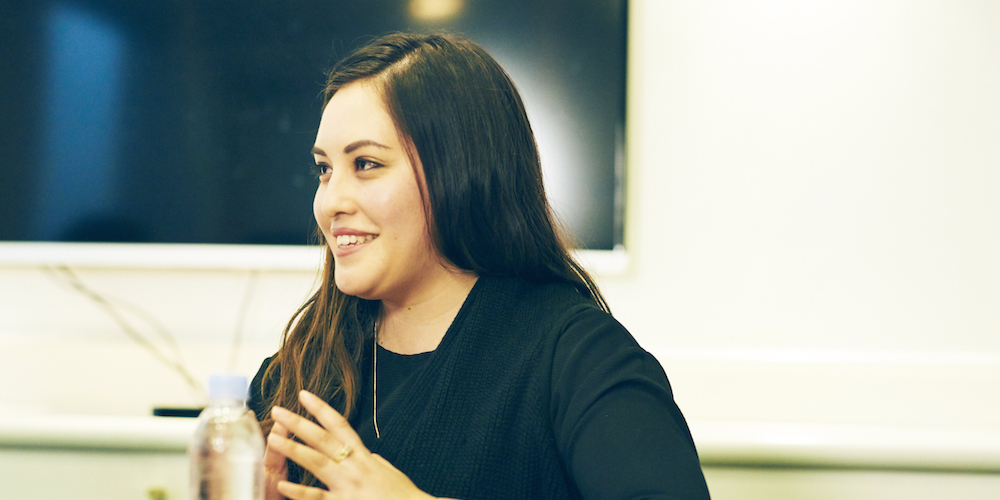
Chace (monopo):In Japan, economic class is quite flat. For example, if you take someone from Azabujuban and Kita Senju, put them in the same room and have them interact, their mannerisms and behavior are not much different. On the other hand, take someone from Beverly Hills and Compton in Los Angeles, you would never confuse one for the other. Tokyo is different from other alpha cities such as London and New York. Other cities have very high costs of living, which limits fluidity in where one chooses to live. Your choice is dependent on economic status and income. However, because Tokyo is such reasonable city to live in, you have the luxury and freedom to choose where you live based on community belonging and preferred lifestyle. I think this dynamic is the fuel of Tokyo’s creative community and allows the city’s various colourful subcultures to spawn and thrive.
ーーThen on the contrary, what are bad things and things that are not good?
Marika (UltraSuperNew): One thing I don’t like about Japanese society is the strong stereotypes that exist regarding how men and women think and feel. One example is the stereotype that men do not like sweet foods and women do not like spicy things. A phrase I heard recently, ‘sweets boy,’ is a name for men who like sweet foods, but it should not be labeled as something out of the ordinary or a trait that contributes to the strong definition of genders. Because the environment I work in is diverse and has a global mindset, this sort of thinking is not as prevalent, but these stereotypes often come up when I am speaking with my Japanese friends and I always stand up against them. Another point I struggle with in Japanese society is the need for lots of information. For example, most of the ads on the trains show an overwhelming amount sentences and characters on top of images. In my work, I often find myself having to find the balance between giving enough information and the minimalism that I believe contributes to better design.
Chace (monopo):Japan has as reputation for always being a few steps behind and always late to the party. On the subject of lots of characters that Marika just spoke of, for example, when a foreigner looks at a certain leading Japanese e-commerce site, they are shockingly overwhelmed with an assault of text and graphic. It’s quite jarring. Even the highest selling streetwear magazines in Japan, the front cover is covered in a lot of text. When I’m in a convenience store with friends that are visiting from overseas, they are at a loss for words. A lot of my company monopo’s recent accolades have been at the hands of a French designer. There is a global standard that is accepted as current and modern.
Deborah (Toboggan inc.): In my opinion, I think a big reason for that is because Japanese believe that they can do everything by themselves to serve only themselves. This way of thinking probably derives from the fact that Japan used to be an isolated country. I wonder if the Japanese have not really changed their thoughts since then. Some of them still seem to think ‘we are fine doing it on our own, so why do we need you?’
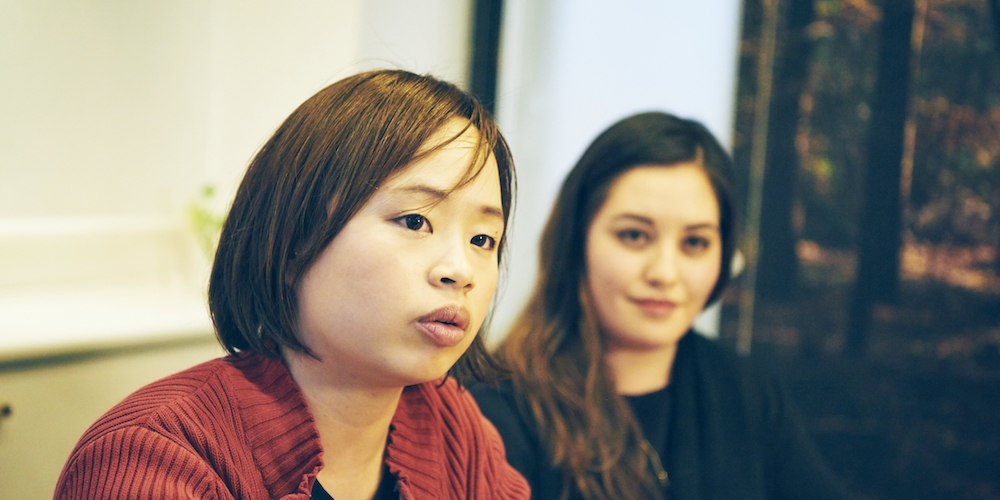
Chace (monopo):That’s right. That is why we are now in a very interesting era, a crossroads in Tokyo’s business history. Because for 500 years Japan made products just for domestic market. They never really had any need or desire to cater to foreign markets. Since we’re seeing steep decline in population and a shrinking domestic market, for the first time in Japanese history, attention to foreign markets and overseas expansion is becoming necessary for survival. That is why I think that helping Japanese organizations unfamiliar with foreign countries’ cultural nuances and language is creating exciting business opportunities for foreigners that know Tokyo well, people with lots of overseas connections.
ーーWhat kind of jobs in Japan would you like to have experience with from here on out?
Marika (UltraSuperNew):In regard to clients I work on, I think it would be interesting to work with a Japanese brand one day. I am currently working with all foreign brands, helping them to create content that is relevant to Japanese society. I think that the mindset and process would be quite different working with a local Japanese brand, and it would be a great learning experience.
Chace (monopo):I would like to continue to cultivate Tokyo’s brand image by showcasing Tokyo’s true culture and lifestyle. It is my mission with poweredby.tokyo. I think that magic happens if there is a platform and space where the people of Koenji and the people of Yurakucho, who affiliate with different views and values, can connect, collaborate, and create. I want to facilitate this movement. Branding Tokyo is challenging. When you hear ‘Tokyojin’, there isn’t an immediate image that comes to mind. Whereas upon hearing Parisian or New Yorker, one has these people etched in their minds. I want to create a place where we can communicate Tokyo’s variety of communities by giving voice to the people who are pushing this city’s culture forward. A place where you can say ‘this is Tokyo!’
ーーWhat do you think about the things that Japan’s creative industry should change from here on out, and things that should continue?
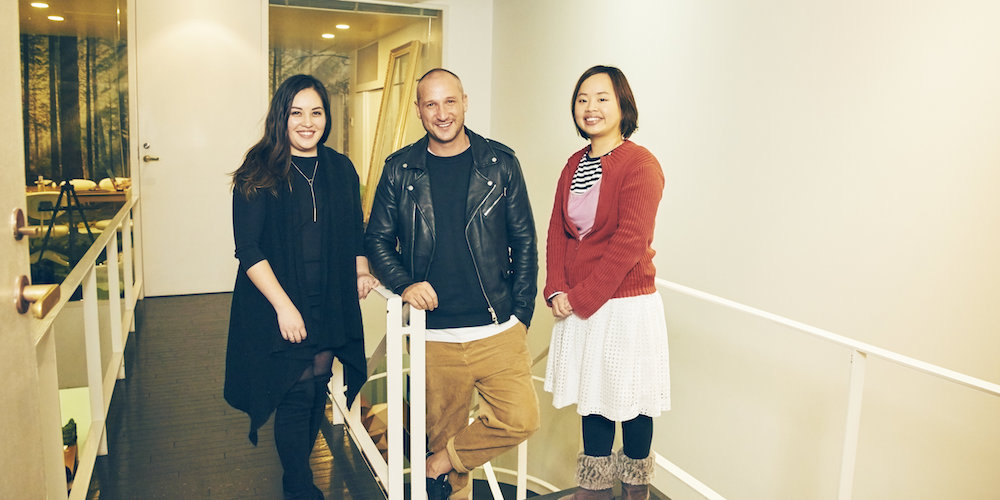
Deborah (Toboggan inc.):Japan’s creativity is really unique, and it would be an immense shame if they were to lose it for the sake of universality. Since ‘2020 Tokyo’s’ theme is Japanese hospitality, it would be great as well if they continue that spirit. The thing that I feel they should change the most is their mentality when a problem occurs. Rather than thinking about ‘whose fault it is’, they should think more about ‘how should I settle the problem’. Also, in Japanese companies, the superior always seems to be harshly scolding the subordinates and that hierarchical relationship is maintained even outside the workplace. For example, when you go drinking with your superiors in Singapore, you socialize there as fellow humans. Whereas when you drink in Japan with your superiors, that hierarchical relationship of the workplace is still present such that if the subordinate does not pour the water for their superiors, it is frowned upon. I think that in order to have a harmonious workplace, it is important to not only have this hierarchical relationship, but also a good friendship with your superior.
Marika (UltraSuperNew):I think that in this industry, Japanese people and foreigners need to work more closely together. It is very common to see brands using incorrect English in their ads and content, which could have been easily corrected with a quick check by an English speaker. Conversely, when working with Japanese traditions and history, it’s important to have a native Japanese person’s input. I would like to further deepen communication between foreigners and Japanese people on a regular basis.
Chace (monopo):I would also like to connect Tokyo’s creative and business communities with foreigners, and give the required support from both sides. This movement of doing business together is already happening, and it will only continue to grow even bigger from here on out, whether one likes it or not. Accept and adapt, or fall behind. I think that when Japan’s design sense combined with more versatile and diverse views and overseas human resources, we will see a great movement in the world of creative industry. What’s important is not just Japan’s unique sensitivity, but the collaboration and integration of Japan’s sense of beauty and ‘iki’ into the greater creative ecosystem. I think that that is the future!
PROFILE
monopo
Established in 2011. The worldview of making new concepts and experiences was established as the brand ‘monopo,’ and produces impressions that surpass culture and language to a global field. In the in-house project ‘powerdby.tokyo,’ we collaborate with BEAMS and Harvey Nichols, and send present day realistic Tokyo brands to the world.
PROFILE
Toboggan inc.
CEO Kaz Shinagawa set up the predecessor to Toboggan USA, Kazcoordination Inc., in 1996 in LA. Leaving his partner, Keita Yamamura, in charge of the LA branch, Kaz moved back to Tokyo in 2010 to establish Toboggan Inc. Toboggan provides solutions that strike home to the world of creativity. With a motto of support filled with a human touch, Toboggan delivers every genre of creativity throughout the world, from brand promotion to an artist’s movie production.
PROFILE
UltraSuperNew
USN is a creative agency born and raised in Harajuku and Singapore. Since 2007 the team of 50-plus staff is developing creative brand communication for international clients with a focus on Asia. The agency also has art galleries on the 1st floor of their offices in Tokyo and Singapore to promote and exhibit Asian art and creativity and is co-founder of art/technology platform MeshMinds.
